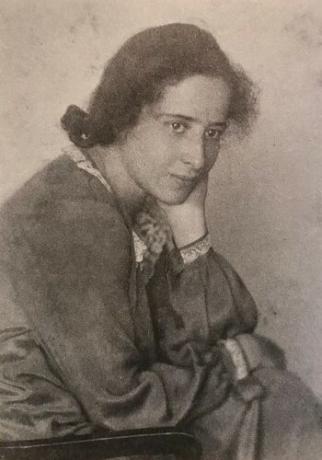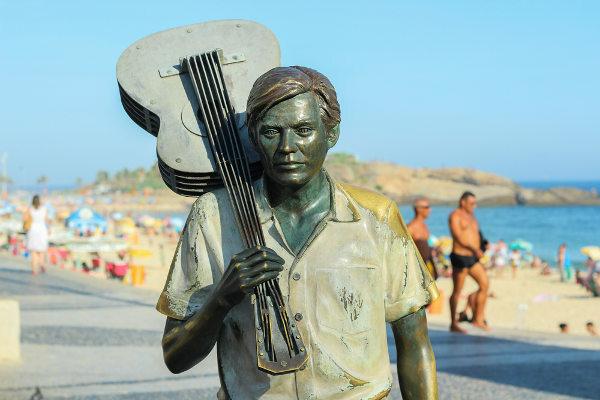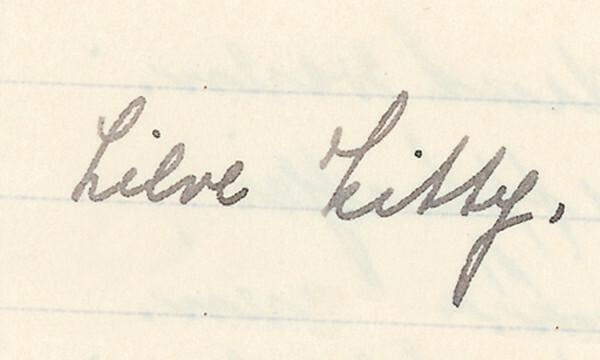Hannah Arendt she stood out as one of the most original thinkers in political philosophy of the 20th century. His books and articles indicate his own way of relating historical events with philosophical notes, emphasizing the issue of freedom. She did not consider herself a philosopher, in the sense of being an expert, and wrote in a clear and accessible language for the general public. After realizing that the ideals Nazis she were gaining acceptance and being arrested, she fled Germany and ended up finding refuge in the United States of America.
She also read: Contemporary Philosophy: Philosophical Period of which Hannah Arendt was a part
Her mother's last entry in the notebook known by the title Unser Kind describes Hannah Arendt as mysterious and difficult. At sixteen, she already knew the philosopher's writings Søren Kierkegaard and she had already finished reading The Critique of Pure Reason, in Immanuel Kant. In a letter to Karl Jaspers, she comments that it is with Heinrich Blücher that her reflections have taken on a political and historical tenor.

Hannah Arendt Biography
belonging to a family jewish With a stable financial condition, Johanna Cohn Arendt, known today as Hannah Arendt, was born in 1906, in the German city of Linden, in former Prussia. Only child from Paul Arendt and Martha Arendt, she studied engineering at Albertina and had a library with many classic books.
Her mother, Martha Arendt, had studied for three years in France and was destined to raise her daughter in an elitist German ideal. One Hannah Arendt's physical and psychological evolution record, made by his mother, is described in a notebook entitled Unser Kind (our baby).
The family moved to the old town of Königsberg (present-day Kaliingrad, Russia) due to the state of health of Paul Arendt in 1909. With her father's death four years later, Hannah Arendt and her mother moved in with her paternal grandfather Max Arendt. An event at the girls' school she attended, the Luiseschule, is presented as indicative of her interest in politics: it was expelled for insubordination, after proposing a boycott of the classes of a teacher who offended her.
Do not stop now... There's more after the advertising ;)
Through her mother, she managed to be led to the University of Berlin, in special condition, and there she studied Latin, Greek and theology. Even after this unfortunate episode, the school allowed her to enroll in the university entrance exam, which was achieved after months of hard study.
Began his university studies in Marburg, in 1924, where she met many students who became important philosophers, such as Hans Jonas and Karl Löwith. her contact with the philosophy and with that university he may have been influenced by an earlier relationship with Ernst Grumach, a student of Martin Heidegger at the time. Her involvement with philosopher Martin Heidegger is known to many, but it became public only years later.
In the mid-1930s, the political situation in Germany already indicated the advance of Nazism, and many began to be arrested and interrogated. in 1933, Hannah Arendt was imprisoned for eight days for trying to obtain documents at the request of Kurt Blumenfeld. After being released, she and her mother left Germany, initially for Prague. Hannah Arendt she went to Paris, where she met Heinrich Blücher, who was not Jewish in 1936, and with whom she lived for many years.
France, unfortunately, went from being a place of hope to becoming a place of captivity a few years later. Both were sent to concentration camps, but remained imprisoned for a few weeks. Apprehensive, shortly afterwards they tried to leave France.
The arrival of the couple to USA, in 1941, was a time of great difficulty. They carried few goods and some manuscripts by Walter Benjamin – a philosopher with whom they had contact in France. The beginning in the new country was painful, especially because of the cultural barrier, and the support they got was limited to paying the rent and maintaining a simple diet. In the meantime, Hannah Arendt she wrote a lot of texts even with the difficulty of needing to write in a new language.
The philosopher remained stateless (no nationality) and consequently, without political rights for 18 years. This experience certainly prompted her reflections. One of the most important texts from this period is precisely the one with the title We Refugees (1943).
They needed help from friends until mid-1951, the year of publication of their first book, The Origins of Totalitarianism. This book made her known as a political theorist and marked the beginning of other publications on political experience. In 1961, the philosopher participated in the trial of Adolf Eichmann, German Nazi official, as a reporter for the newYorker. His conclusions on the character of this German officer and on the participation of Jews in the Nazi scheme caused revolt in many, especially Jews, being criticized in publications and lectures that granted.
Hannah Arendt continued to publish articles and books, being the most philosophically relevant the human condition (1958), which made him the first woman to be invited as a visiting professor at Princeton.

She received several invitations to speak and act as a professor at many other universities, with the period in which she served at the University of Chicago (1963–1967) and at the New School of Social Investigation in New York (1967–1975) her last teaching occupations. Her most important work was being prepared when she passed away a few weeks after her 69th birthday.
the life of the spirit it aimed to investigate the human mind and reasoning. The first and second parts, Think and To want, were already finished, with the final part, To judge, unfinished. The thinker was putting together drafts to type this last part on her death day. The posthumous edition of this work was done by her friend Mary McCarthy.
readalso: Final solution: the Nazi plan to exterminate the Jews in Europe
Hannah Arendt's Top Ideas
Hannah Arendt wrote in a own style, relating events and theories that offered a new approach to dealing with the difficulties that were occurring in her time. It can be said that there is a common theme in all his reflections: political life. Based on a phenomenological approach, analyzed historical events without departing from traditional concepts of the history of philosophy. He thus evidenced what was at the base of the phenomena. In this sense, he did not just propose a historical approach, as if trying to induce something from an accumulation of facts.
![The discovery of the concentration camps influenced the writing of The Origins of Totalitarianism. [1]](/f/3f149bb814d13a6cd56958aa89d62012.jpg)
It is considered that much of the production of this thinker is a continuation or clarification of her investigation into the phenomenon of totalitarianism in your first book, The Origins of Totalitarianism. Although certain conditions were already present in previous historical moments, the totalitarian regimes implemented a unique political oppression: terror is your essence. A state of total domination removes from individuals what makes them human and controls the public space, making a genuinely political attitude unfeasible.
Hannah Arendt considered, in any case, that the adhesion of the population was one of the main factors for the installation of a totalitarian government. THE ideology it would be the instrument used to provide a system of explanations that made any dissent or opposition void.
In the human condition, presents the notion of active life in opposition to the contemplative, theoretical conception. This notion represents three aspects of human activity: labor, work and action. O labor meets the biological needs of an individual and species; O work indicates the distance from nature, building the artificial world in which we live; and the action it differs from the others because it does not depend on any means, that is, the action is free and is an end in itself. It is what best characterizes the ability of human beings to start something new, to provoke the beginning, since there are no restrictions or conditionings on the result of this action. The place of manifestation of this action is the public sphere, which would resemble the notion of polis in ancient Greek philosophy.
See more: Michel Foucault: biography of this poststructuralist philosopher
Main works and quotes by Hannah Arendt
- The Origins of Totalitarianism: Anti-Semitism, Imperialism, Totalitarianism(1951): indicates how totalitarian regimes represent a gradual annihilation of human dignity. They are presented as a form of political organization based on terror, with no equivalents to tyrannies or dictatorships that have occurred in history.
"The establishment of a totalitarian regime requires the presentation of terror as a necessary instrument for the realization of a specific ideology, and this ideology must gain the buy-in of many, even the majority, before terror can be established." |1|
- the human condition (1958): work of philosophical content in which he investigates different types of action to specify the constituents of political attitude. He criticized the valorization of the theoretical perspective, traditionally implemented by philosophy, to the detriment of action.
“Men are conditioned beings: whatever they come into contact with immediately becomes a condition of their existence. The world in which the active life it consists of things produced by human activities; but, constantly, the things that owe their existence exclusively to men also condition their human authors.” |2|
- Eichmann in Jerusalem: An Account of the Banality of Evil (1963): text in which he presents his impressions of Adolph Eichmann, a German Nazi official.
“The problem with Eichmann was exactly that many were like him, and many were neither perverts nor sadists, but were and still are terribly and frighteningly normal. From the point of view of our institutions and our moral standards of judgment, this normality was far more appalling than all atrocities. together, for it implied that - as was insistently said at Nuremberg by the defendants and their lawyers - this was a new type of criminal, in effect. hostilis generis humani, who commits his crimes in circumstances that make it virtually impossible for him to know or feel that he is acting in a wrong." |3|
- we refugees (1943): article where he exposes and reflects the difficulties of those who needed to seek refuge even without having undertaken a political act against the government of their country.
“Apparently, no one wants to know that contemporary history has created a new kind of human being - the kind who is put in concentration camps by his enemies and in prisons by his friends” (translation Wow).|4|
Grades
|1| RENTAL H. The Origins of Totalitarianism: Anti-Semitism, Imperialism, Totalitarianism. Translation by Roberto Raposo. São Paulo: Companhia das Letras, 2012.
|2| RENTAL H. the human condition, 10th ed. Translation by Roberto Raposo. Rio de Janeiro: University Forensics, 2007b.
|3| RENTAL H. Eichmann in Jerusalem: An account of the banality of evil. Translated by José Rubens Siqueira. São Paulo: Companhia das Letras, 1999.
|4| RENTAL H. The Jewish Writings. KOHN, Jerome; FELDMAN, Ron H.. (Eds.) New York: Schocken Books, 2007a.
By Dr. Marco Oliveira
Philosophy teacher


